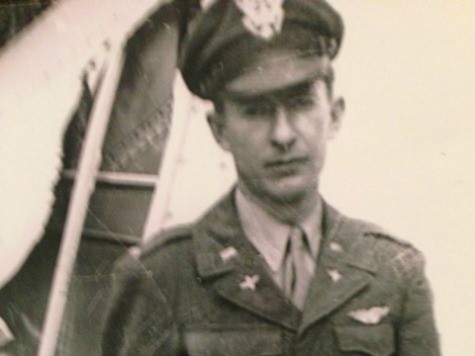
It was just after midnight on March 25, 1945 when B-29 bombardier Scott Downing and his crew dropped their incendiary ordnance on Tokyo and banked northeast to head back to the U.S. base. While banking, Downing noticed one of the bomb bay doors was jammed open. He recalled: “It was while we were trying to get that damn thing shut that we were hit.”
Downing did not know whether his plane had been shot by a Japanese fighter or by anti-aircraft fire. He only knew the plane had been struck more than once and that the inside of the big bird was filling up with smoke.
Although “the number three engine was on fire and burning,” Downing and the rest of the crew were able to “fly level for three or four minutes.” After that, they all began to bail out. He noticed that all eleven crew members got out. But he also noticed that the fires in Tokyo made the night sky as bright as daylight. This meant Downing and his fellow crew members were easily visible to farmers and military personnel on the ground as they parachuted through the sky.
Downing landed about 15 miles outside of Tokyo. He said he buried his .45 pistol, “hid out for about two minutes,” and was then captured by “a bunch of farmers.” He was taken to a barn full of horse stables somewhere in the vicinity of the Japanese Western Army Headquarters.
There were six stables in the barn. Each had been boarded up so that all windows and openings were covered and any half walls had been turned into full ones. The stables were now cells. Although they measured less than eight by twelve feet in diameter, Downing and 18 other POWs were crammed into one of them for months. Conditions were so tight that when everyone would lie down to sleep, the only way to turn over was to stand in place, turn, and then lie back down.
Downing said there were no secrets between the prisoners. In one of the corners of the cell by an outside wall, there “was a four-by-four foot concrete slab raised about four inches above floor level–there was a hole in the slab with a wooden lid on it.” The prisoners stood and squatted over this hole to relieve themselves throughout their captivity. The hole was also part of the floor on which they slept, so they rotated positions every day to give each prisoner the task of sleeping over that hole every 19th day.
Throughout his captivity, Downing was fed one ball of rice a day. He said the cell guard would open the door and roll the rice balls across the floor to the prisoners.
At the beginning of his captivity, this ball of rice was about the size of a baseball. As the end of the war drew closer, it shrank closer to the circumference of a golf ball. Downing said the POWs would each eat their own rice, then those who were physically able would get on their hands and knees and lick the floor of the cell to get any kernels that had become lodged in the wooden planks when the rice balls were rolled into the stable.
After the atomic bombs were dropped on Japan–Hiroshima on August 6, 1945 and Nagasaki on August 9–Downing and his fellow prisoners were moved to Omori: a manmade island between Tokyo and Yokohama. For the first time in months, Downing was able to bathe and to walk outside the confines of a cell.
He was liberated on August 29, 1945 when taken aboard the hospital ship Netherlands.
Although his story is overwhelming in every way and his sacrifice beyond belief, if you were to speak with Mr. Downing today, he would be quick to say, “I didn’t do anything special, I just did my duty.”
On November 11, 2013, Breitbart News is proud to remember Mr. Downing’s sacrifice.
Follow AWR Hawkins on Twitter @AWRHawkins.

COMMENTS
Please let us know if you're having issues with commenting.